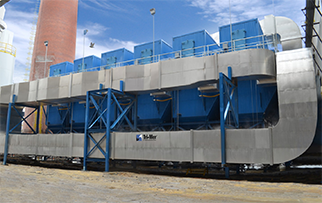
 Downloads
DownloadsTri-Mer’s UltraCat glass furnace emissions filters deliver significant advantages in terms of sorbent use, maintenance requirements, and redundancy.
UltraCat Catalytic Filter systems require much less sorbent to reach a given SO2 removal than ESP. This is because the sorbent accumulates on the filter surface, creating a filter cake. All the gas must pass through this cake, adding exposure and time for sorbent chemistry to occur. This is true for any sorbent, SBC or hydrated lime.
Another advantage is the built-in redundancy inherent in this multiple module system. There is no “control device” bottleneck that can compromise furnace operation. To meet the flow requirements, several housing modules are placed in parallel. In the rare event that service is needed for one module, the entire flow volume is directed through the other modules, which temporarily operate at a high pressure without a loss of performance. The module under service is then brought back online and the pressure returns to normal.
This equates to a significant reduction in the cost of ownership compared to ESP.

Multiple plenum modules are ducted together to engineer ceramic filter systems that accommodate any flow volume. The facility shown here produces over 600 tons of glass per day. The system removes PM,SO2, HCI, metal and NOx.
Standard ceramic filters have been used for PM control by the U.S. military at munitions destruction facilities in Indiana, Utah, and Oklahoma since 2000, and there are hundreds of ceramic filter systems operating worldwide. With the additional capability of NOx control, these filter systems have become the technology of choice for many applications. The glass industry recognized the merits of the technology and responded with swift adoption.
Complete glass furnace emissions systems with integrated dry sorbent injection and ammonia injection are available from Tri-Mer Corporation. Tri-Mer has successful projects in tableware, container, and flat glass throughout the US. Central and South America also benefit from Tri-Mer’s turnkey engineering, project management, and installation services. In addition to glass emissions industry, there is a fast-growing base of successful systems serving a broad range of industries.
• Particulate (PM 10, PM 2.5, PM 1.0) • NOx • SOx (SO2, SO3) • HCl, HF • Metals (Selenium, Arsenic …) • Mercury • Hexavalent Chrome • Dioxins / Furans • Selective VOC (Cement O-HAPS) • Add-on CO module available